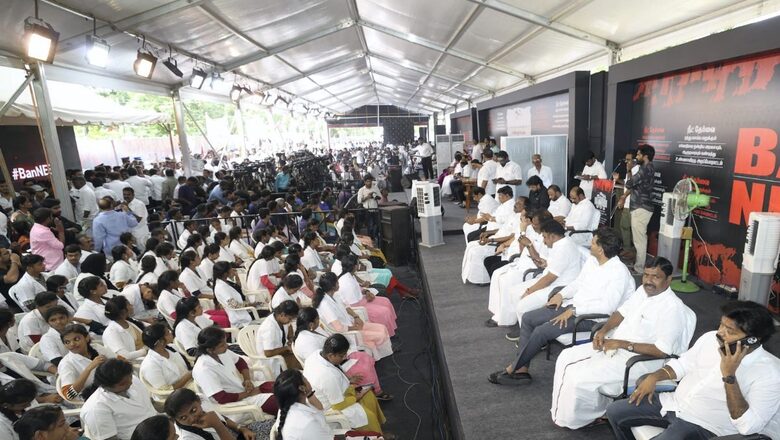
views
Dravida Munnetra Kazhagam (DMK) and its office bearers have been in the vanguard of those opposing the National Entrance-cum-Eligibility Test (NEET). The DMK is opposed to NEET, saying it is against social justice, insisting it favours urban students and those having access to coaching centres. Tamil Nadu’s Chief Minister MK Stalin and his son and cabinet minister Udhayanidhi are spearheading the campaign against NEET. Udhayanidhi, who is also a leading film producer, organised a state-wide one-day hunger strike on August 21, 2023.
As part of his campaign, Stalin in 2021 had sent letters to the chief ministers of Andhra Pradesh, Chhattisgarh, Delhi, Jharkhand, Kerala, Maharashtra, Odisha, Punjab, Rajasthan, Telangana, West Bengal and Goa claiming that the introduction of NEET violated the Constitutional balance of power, by curbing the rights of state governments to decide on the method of admission to medical institutions founded, established and run by them. A copy of the ‘Tamil Nadu Admission to Undergraduate Medical Degree Courses Act, 2021,’ passed by the state assembly was also enclosed with the letter, which pointed out that NEET went against the spirit of federalism.
Why this anathema against NEET?
To get to the real answer, one needs to lift the veil of secrecy about the ownership of the 32 private medical colleges in the state of Tamil Nadu. All private medical colleges and deemed-to-be universities are invariably run by educational trusts, mostly owned and managed by politicians and their family members. Prior to the introduction of NEET, these medical colleges had a free run collecting exorbitant capitation fees in cash, not paying any taxes, and generally admitting students from rich and elite families, wards of bureaucrats and those running private hospitals and nursing homes.
Needless to say, meritorious students hailing from poor families had to depend on admissions to government medical colleges, which were bound by the reservation policy. The meritorious never got a chance, whether in private or government-run medical colleges, unless they could afford to shell out cash in lakhs. The trusts are cleverly denoted as educational or charitable trusts, run by political families to escape taxation. It was a great conspiracy, comprising the management, parents of rich students and the students themselves. None of the conspirators would ever divulge or complain about the capitation fee rates, cash transactions done in secrecy, or the brokerage paid to those facilitating such admissions.
Another great revelation is that those who managed to secure such high-capitation fee entry were invariably those having low marks! Alarm bells started ringing in various quarters about the poor and sub-standard quality of those entering the medical profession, and the deterioration of health and medical services. It was an open secret that one pays a capitation fee not only to enter but also to come out. These products joined either their family-run hospitals or enrolled in commercial private hospitals where fleecing patients and insurance companies became the accepted norm.
The situation in other states is also similar. Karnataka has the highest number of private medical colleges in India, with a staggering number, counting at over 40 institutions. As in Tamil Nadu, many are administered by political families and their dubious charitable trusts. A Supreme Court verdict in the TMA Pai Foundation Vs Karnataka government put a stop to government intervention in privately-run educational institutions, thereby giving them a carte blanche to extort capitation fees. Across private medical college campuses, there are hushed whispers of capitation fees cash being loaded onto trucks, escorted by gundas, to the residences of the trustees! Family patriarchs self-appoint themselves as chancellors, children as pro-chancellors, even today. As of today, neither the Ministry of Education, UGC, NAAC nor NIRF has dared to stop this absurdity.
NEET was introduced in 2013 by the Medical Council of India (MCI), primarily to get rid of the malaise of capitation fees, and ensure that students are selected based on a single, standardized test rather than multiple state-level exams. It also put an end to the associated money laundering and hawala business, with links in Dubai, Singapore and other tax havens. The lack of any independent and credible audit facilitated a flourishing tax-free cash economy, resembling gambling casinos. Most of the cash generated went into filmmaking, real estate and liquor business. The introduction of NEET became a game-changer for lakhs of meritorious students across the country. The scourge of capitation fees stands controlled to a great extent. It is not fully eradicated, but the rot has been stemmed considerably.
However, the sudden absence of a voluminous flow of annual liquid cash bonanza has come as a rude jolt to private medical college managements and politicians, hence the continuous efforts and clamour to revert to the erstwhile money minting format. The reasons cited are rural candidates are affected and cannot afford coaching centre fees. What is the true picture in Tamil Nadu?
The ‘Impact of NEET on Medical Admissions in Tamil Nadu’ report of 2021 revealed that there are more than 400 active coaching centres in Tamil Nadu with the total business being approximately Rs 5,750 crore, exclusively incurred on NEET. This year, Tamil Nadu broke its own record by bagging the highest tally in the top 50 positions among those who cleared the exam and also emerged as the state with the third-highest tally of candidates in the top 50 rankers. Unfortunately, Tamil Nadu has seen about 21 NEET-related suicides, and private college managements are playing this up for rescinding NEET. There are no student-satisfaction survey reports to gauge NEET acceptability by students, who are the real beneficiaries. What people get to read in the media are only the vociferous rants of politicians and greedy private management.
Going by the logic of DMK politicians, the Civil Services Examination also needs to be scrapped, as rural students are disadvantaged and cannot access costly, private coaching centres. How was this situation remedied in Tamil Nadu? In the Civil Services Examination results of 2022 declared in May 2023, none from the state made it into the top 100. Only 42 candidates made it to the IAS, IPS, and other Central Services. But, the Tamil Nadu government did not demand the scrapping of CSE, instead, rolled out a scheme to help civil services aspirants access better coaching facilities and materials, to reverse the declining number of students from the state clearing the examination. Under the scheme, which was announced in the state budget 2023-24, 1,000 civil services aspirants would be shortlisted every year through a test and each of them would be provided Rs 7,500 a month for 10 months to prepare for the preliminary examination.
If the DMK government is really aggrieved about NEET admissions, why not a similar scheme be put in place? The MBBS course fee is vastly different for the government/government-aided institutions/central universities and private institutions/deemed universities, not only in Tamil Nadu but all over India. Why not take up the issue of uniform fee structure in all colleges, after all, the syllabus is the same everywhere and in all institutions. There are institutions charging a whopping Rs 70 lakh upwards for a medical UG program. Why not show concern for poor students by launching a campaign for uniform tuition fees? Will DMK take up the gauntlet?
It will no longer be possible to revert to old ways that aptly suit the prognosis of a decadent society. As Ayn Rand said, “When you see that in order to produce, you need to obtain permission from men who produce nothing – When you see that money is flowing to those who deal, not in goods, but in favors – When you see that men get richer by graft and by pull than by work, and your laws don’t protect you against them, but protect them against you – When you see corruption being rewarded and honesty becoming a self-sacrifice – You may know that your society is doomed.”
Dr G Shreekumar Menon IRS (Rtd), PhD (Narcotics), is Former Director General, National Academy of Customs, Indirect Taxes & Narcotics. Views expressed in the above piece are personal and solely that of the author. They do not necessarily reflect News18’s views.
















Comments
0 comment